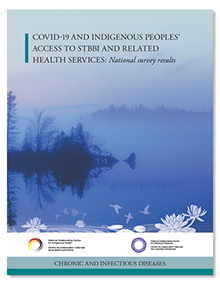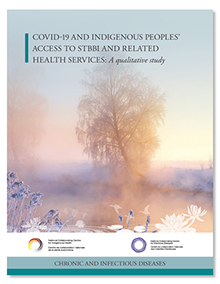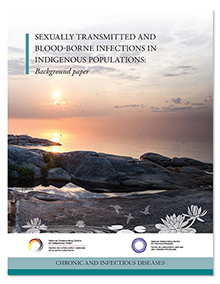Ten knowledge translation products
Together, the National Collaborating Centre for Indigenous Health (NCCIH) and National Collaborating Centre for Infectious Diseases (NCCID), with the support of the Public Health Agency of Canada (PHAC), have developed a suite of ten knowledge translation products to enhance understanding of how the COVID-19 pandemic affected the accessibility, availability, and delivery of health services for sexually transmitted and blood-borne infections (STBBI), including harm reduction services, for First Nations peoples, Inuit, and Métis peoples during the pandemic.
The ten knowledge translation products include: a report on a national survey; a report on a qualitative study; four documents summarizing the reports (of which, two are infographics and two are report summaries); and a background report that reviews the literature on STBBIs among First Nations peoples, Inuit, and Métis peoples, accompanied by three plain language summaries.

Resources related to the national survey
The NCCIH and NCCID have worked in partnership with the PHAC to analyze quantitative data from the Impact of COVID-19 Survey 1, coordinated by PHAC. The Impact of COVID-19 Survey, conducted from July 2021 to January 2022, assessed the impact of COVID-19 on the delivery and access to STBBI prevention and testing services, including harm reduction services, on key populations in Canada.
The following resources have been produced by the NCCIH and NCCID to uncover and explore the survey findings, as it relates to experiences of First Nations, Inuit, and Métis teens and adults who engaged with STBBI and related health services during the COVID-19 pandemic:
- The report, COVID-19 and Indigenous peoples’ access to STBBI and related health services: National survey results, explores findings from the Impact of COVID-19 Survey in depth and assesses how the COVID-19 pandemic affected STBBI service access for Indigenous peoples, while also offering insight for future public health planning and emergencies.
- The report summary, COVID-19 and Indigenous Peoples’ access to STBBI services: Summarizing survey, interview, and focus group findings, combines key and common findings from the Impact of COVID-19 Survey and a NCCIH-NCCID qualitative study to summarize what is known about the pandemic effects on STBBI service access from a quantitative and qualitative lens.
- The infographic, COVID-19 and Indigenous Peoples’ access to STBBI services: Summarizing a national survey, summarizes findings from the Impact of COVID-19 Survey, exploring topics of STBBI service access and barriers, mental wellness, and access to cultural supports.

Resources related to the qualitative study
From February to July 2022, the NCCIH and NCCID conducted interviews and focus groups with 72 people from areas across Canada to learn from the lived experiences of First Nations peoples, Inuit, and Métis peoples who engaged with STBBI and related health services during the COVID-19 pandemic. This study augments findings from the national survey to provide depth and voice to the experiences of First Nations, Inuit, and Métis STBBI service users, service providers, and policy- and decision-makers. The following resources explore the findings of the qualitative study:
- The report, COVID-19 and Indigenous peoples’ access to STBBI and related health services: A qualitative study, explores the qualitative study in depth, describing the perspectives of First Nations peoples, Inuit, and Métis peoples on the successes and challenges of the pandemic and their recommendations to improve STBBI and related health service access in the long term.
- The report summary, COVID-19 and Indigenous Peoples’ access to STBBI services: Summarizing a qualitative study, provides a synopsis of the qualitative study, focusing on STBBI service delivery changes in clinical care, outreach, patient-provider relationships, and care environment during the COVID-19 pandemic.
- The infographic, Lessons from COVID-19: Recommendations to improve Indigenous Peoples' access to STBBI health services, summarizes recommendations from First Nations, Inuit, and Métis STBBI service users, service providers, and policy- and decision-makers to improve access to STBBI services, based on their experiences during the COVID-19 pandemic.

Background resources
The background paper, Sexually transmitted and blood-borne infections in Indigenous populations, was developed to complement the qualitative and quantitative research on the impacts of the COVID-19 pandemic on Indigenous Peoples’ access to STBBI services. It provides a review of the literature to enhance understanding of the broader factors that influence STBBI transmission, prevention, and treatment among Indigenous Peoples; the experiences of First Nations peoples, Inuit, and Métis peoples with STBBIs; and strategies for addressing the disproportionate rates of STBBIs in Indigenous communities. The background report is accompanied by three plain language summaries, each focusing on different sections of the background report.
The three plain language summaries include: